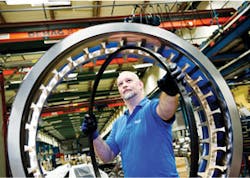At Air Products & Chemicals Inc., about 150 skilled-labor jobs are open and unfilled at any given time in the United States. The positions run the gamut from welders and instrument electrical technicians who work with sophisticated controls to diesel mechanics, pipe fitters and mechanical engineering technicians.
See Also: Manufacturing Workforce Management Best Practices
Those unfilled positions represent 38% of the roughly 400 skilled-worker positions Air Products attempts to hire each year for its U.S. workforce, which numbers about 7,500.
"In some cases [a position] takes as long as a year to fill because of a mismatch of skills -- either in the skills area we need or in the geographic area where we need that skill," says John McGlade, chairman, president and CEO of the Allentown, Pa.-based firm.
It's a concern for Air Products (IW 500/107), and not only in the skilled labor arena -- although that is where McGlade says the issue is most acute for Air Products -- but across multiple talent levels. "We can't grow our business without talent at all different levels, with all different skill sets," the CEO says.
Like many U.S. manufacturers, Air Products attributes its talent shortages in part to an aging baby boomer generation who have begun their exodus from the U.S. workforce. The oldest baby boomers turned 65 on Jan. 1, 2011, and every day thereafter for about the next 19 years, some 10,000 more will reach the traditional retirement age, according to the Pew Research Center.
But it's not just the departure of older, seasoned workers that is raising fears of vanishing manufacturing skills in the United States. The specter of knowledge walking out the door with retirees is buttressed by what many perceive as a lack of interest by young people in manufacturing as a career.
"Very few students in school aspire to work in manufacturing," Pete Selleck, president and chairman of Michelin North America, said during a keynote address at the recent IndustryWeek Best Plants conference. As evidence, he pointed to a curriculum development process employed in South Carolina (where the tire manufacturer's North American headquarters is located), in which students at a certain age begin to identify the career "clusters" that interest them. While STEM ranked third, "that's good news," manufacturing ranked 14th of 16 choices.
Not so good.
Between retiring baby boomers and uninterested youth, age clearly is taking its toll on U.S. manufacturing skills. There's growing evidence, however, that manufacturers have begun identifying age as a potential solution to manufacturing's talent shortage as well.
Indeed, changing the negative perception of manufacturing among youth and their parents has become an integral component of closing the skills gap for a growing number of manufacturers. Companies including Air Products, Alcoa (IW 500/48) and Michelin (IW 1000/160) are partnering or otherwise working with educational institutions at all stages of student development to help set curriculum and raise manufacturing's profile.
Developing 21st Century Skills
Air Products, for example, hires approximately 30 interns per year from area high school career technical and vocational technical programs. That said, much of the company's engagement with students comes via its involvement with SkillsUSA, a nonprofit organization that serves more than 300,000 teachers and high school and college students who are preparing for careers in trade, technical or skilled service occupations. The organization receives significant active support from a large number of corporations, including Air Products, which provides financial support for SkillsUSA initiatives and has employees serving on task forces and boards of state and local SkillsUSA chapters as well as technical committees.
See Also: A Military Solution to the Manufacturing Skills Shortage
"Our association with SkillsUSA is one of the most important partnerships we can have as a corporation," said McGlade in 2010 when he was named the inaugural recipient of the SkillsUSA CEO Champion of the Year.
It is a claim he would still make today, for several reasons. Among them is his belief that truly addressing the skills shortage will require a dialogue that includes educators, government, parents and students. SkillsUSA helps create an environment for that conversation to occur, McGlade says.
In addition, the Air Products CEO says Skills- USA focuses not only on direct technical skills, but also on what he describes as equally important "21st century" skills such as communication, teamwork, math and leadership.
Moreover, he's clearly impressed by the caliber of many of the young adults engaged in the program, and praises the organization's annual convention, which includes the finals of a nationwide skills competition.
"It is one of the most empowering, liberating and wonderful events, where you see some of the best of the best competing against each other in some 100 different skills, from food services to airplane turbine mechanics and everything you can think of in between," he says.
McGlade says that while there is an admittedly selfish component to providing internships and the SkillsUSA participation, the benefits extend well beyond the obvious. "[Participation] gives us access to students and insight as to who the best students are," McGlade says. That said, "Probably one of the most exciting points that I didn't appreciate earlier on was how motivating it is for some of the employees who are involved with these programs."
An Invite to the Plant Floor
Michelin's efforts to encourage youth to consider a manufacturing career include working to bring teachers and middle school students into its manufacturing plants. The company wants to dispel the notion -- still held by many, Selleck notes -- that manufacturing plants today remain the dirty, harsh environments they were 50 years ago.
"Our plants, and your plants, are much different than that today," Selleck said during his IW Best Plants conference keynote address.
Still, Selleck exhorted manufacturers to do more.
"We've got to not only get [young people] interested, but then we have to put our young production folks, our young maintenance folks, our young engineers, our young business unit leaders in front of those 14 year olds and explain to them how they got to where they are 10 years later," he said. "Explain to them the choices that they made, the things that they chose not to do in order to make sure they had a chance to get to these very, very lucrative jobs."
Alcoa is among manufacturers doing more, much of it through the company's Alcoa Foundation. For example, the foundation presented the Society of Women Engineers with a $50,000 grant earlier this year to support outreach programs on five U.S. college campuses. The programming, directed toward kindergarten through high school students, is designed to inspire girls to pursue careers in engineering.
A $50,000 contribution also was made to the National Society of Black Engineers' 2013 SEEK (Summer Engineering Experience for Kids) Academy. The program aims to raise interest among underrepresented minorities in science, technology, engineering and math.
"We need these skill sets to grow and perform," says Natalie Schilling, Alcoa vice president of human resources, global primary products.
Alcoa's efforts to address the talent crunch extend beyond providing grant dollars. The manufacturer is actively engaged in STEM programming and curriculum development with educational institutions. Partnerships, Schilling says, are key to making such initiatives work.
Helping Colleges Help You
Manufacturers continue to team with local community and technical colleges to develop pipelines of talent. Michelin, for example, engages with community and technical colleges in areas where the company has manufacturing facilities. During his conference address, Selleck lauded the educational institutions' willingness to work with private business to develop curriculums that teach the skills required of today's manufacturing workforce.
SKF USA (IW 1000/445), on the other hand, is developing a community college outreach program in response to schools' requests for support in developing training materials. Initially provided on an ad hoc basis as requests came in, "we realized there seemed to be a need for this in the market, so we said, 'let's put it together in a better way,'" says Joe Bruno, director of training and development at SKF USA.
What SKF put together is a program comprised of instructional materials, product samples and a free seat for instructors in the company's Reliability Maintenance Institute training program for external customers.
SKF will provide the outreach program to community and technical schools at no cost. "From our standpoint, we wanted to get our names in front of these young people," Bruno says. "Down the road they could be our customer or our employee."
Ultimately, manufacturers can always do more to help assure a strong and stable pipeline of talent, says Air Products' McGlade. However, "I think you'll find that there are a tremendous number of programs out there where companies, one on one, are working with their local community college or working with their local vo-tech school. There's a thousand points of light," he adds.
About the Author
Jill Jusko
Bio: Jill Jusko is executive editor for IndustryWeek. She has been writing about manufacturing operations leadership for more than 20 years. Her coverage spotlights companies that are in pursuit of world-class results in quality, productivity, cost and other benchmarks by implementing the latest continuous improvement and lean/Six-Sigma strategies. Jill also coordinates IndustryWeek’s Best Plants Awards Program, which annually salutes the leading manufacturing facilities in North America.
Have a story idea? Send it to [email protected].




